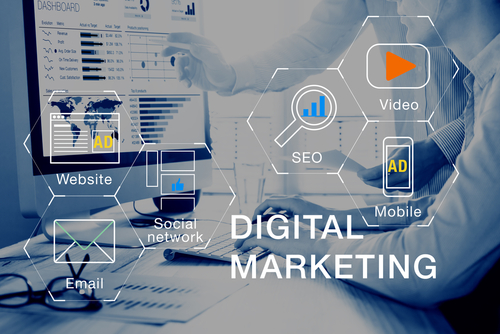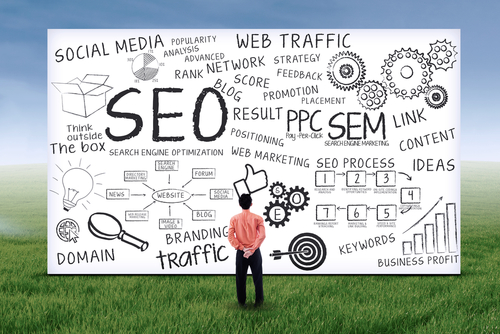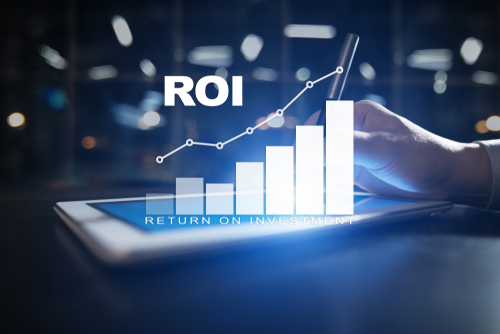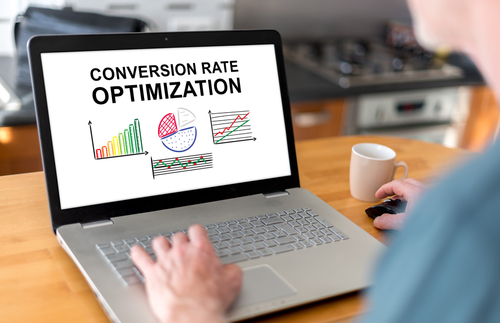According to industry leaders, by 2021, more than 75% of total marketing budgets for leading brands will be spent on digital marketing over traditional marketing methods. Digital marketing allows companies to attract customers, shape brand awareness, and generate sales from a global audience.
Whether you’re just looking to learn more about a growing trend or you’re ready for an exciting career change, below you’ll find the resources you need get started in the world of digital marketing. In just 15 minutes you will get a quality overview. Spend 2 or more hours with the additional resources.
Table of Contents
Section 1: What is Digital Marketing?

While there’s no one set definition, digital marketing describes using electronic sources (e.g., the Internet, mobile devices, social media, search engines) to sell a product or service. Most companies view digital marketing differently and have a different strategy for digital marketing than traditional marketing avenues like print ads, radio, newspapers, billboards, and television. Given how rapidly technology changes year-over-year, digital marketing also continues to rapidly expand and evolve.
With billions of potential customers now accessing the web, there’s no limit to who a company can offer a product or service to. Potential customers can access the Internet 24/7, giving companies opportunities to interact and engage like never before.
Some of the other benefits of digital marketing include:
● Considerably less cost than traditional methods of print ads, radio, and television.
● The audience is not limited to the immediate geographic area of the business. Businesses can operate in a 24-hour, global marketplace.
● Easier to build brand awareness and brand loyalty by connecting with audiences where they hang out online.
● Ability to measure and track how different audiences respond to various marketing strategies. Often, digital marketing data can be analyzed in real-time.
What do you think?
What is the role of a digital marketer?
Additional Resources about Digital Marketing
- Definitions of Digital Marketing, Internet Marketing & Online Marketing
- What Is Digital Marketing and Why It Matters – The SAS Point of View
Section 2: Important Terms and Definitions
There are some basic terms and definitions that describe the fundamentals of digital marketing.
These are helpful for anyone learning more about digital marketing:
● Adwords (Google Adwords) – A program digital marketing firms use to create and manage Google advertising. Ads created through Adwords can be placed on search results, Youtube, or other Google ad network sites.
● Analytics – Statistics and data about potential and existing customers collected on websites and social media platforms.
Digital marketers understand how to collect information on consumers and consumer behavior using analytics programs to generate more sales. Analytics can also be used to identify a target group to market a product or service.
● Campaign – Multiple ads or marketing materials generated to sell a specific product or promote a brand to a target group.
Campaign ads all share similar themes, visuals, and messaging designed to be shared across different digital platforms, including email, social media, and web ads.
● Content Marketer – A digital marketing professional that specializes in promoting online media. Content marketers may produce written media like blog posts, articles, or social media posts. They may also create videos and images that promote a brand, product, or service.
● Digital Marketing Channels – Any method to present a product or service to a potential consumer. Digital marketing professionals become experts in digital marketing channels, including email marketing, advertisements, search engine optimization, and social media marketing.
● Email Marketer – A digital marketing professional specializing in using email to promote a product or service. Email marketers produce sequences of emails to meet marketing goals, including generating sales leads, boosting sales and discounts, encouraging repeat customers.
● Inbound Marketing – Techniques used by digital marketing professionals to attract customers to a website or a brand. Inbound marketing typically involves a strategy of creating content or free offerings that draws a consumer to an item or service for purchase.
● Online Marketing – Using Internet or web-based technology to promote a product, service, or brand. Online and digital marketing are often used interchangeably. However, digital marketing extends to all devices and platforms, even if they may not be online.
● Social Media Marketer – A digital marketing professional specializing in using social media platforms (Facebook, YouTube, Twitter, etc. to promote a product or service. Social media marketers often use creative storytelling, paired with other written, visual, and video-based content to meet marketing goals.
● Web Design – The process of creating and producing websites, including writing code, creating web page layouts, writing content, and developing user experience. Digital marketing professionals work closely with web designers to ensure that websites are optimized to reach a target group.
What do you think?
Which digital marketing terms were new to you? Which terms would you add to this list for a better understanding of the digital marketing industry?
Additional Resources for Digital Marketing Terms and Definitions
Section 3: Types of Digital Marketing

As mentioned above, digital marketing encompasses many different avenues to identify and engage consumers. There are hundreds of different techniques and methods that digital marketing professionals use to promote products, services, and brands. As new technology emerges, new types of digital marketing are also likely to arise. Right now, these are the most common types of digital marketing:
● Affiliate Marketing – Some brands rely on other businesses, websites, and influencers to promote products and services. Affiliate marketing describes the process of promoting another person or company’s products for a commission using websites, email, social media, or another digital marketing platform. For each sale made online, the company pays the promoter a small fee for generating a referral.
● Content Marketing – Content marketing describes the process of creating content (blog posts, podcasts, videos, photos, etc.) rather than relying on advertising alone to market a brand or business. Digital marketing allows brands to use a variety of different forms of content to educate and inspire a target audience.
● Influencer Marketing – Sometimes, brands partner with experts, celebrities, and industry leaders to promote products, services, and brands. Similar to affiliate marketing, the influencer promotes the brand with its own audience and may or may not receive compensation for sharing the product or service. Many influencer marketing campaigns happen on social media platforms like Instagram and YouTube, where influencers have large audiences that brands use to generate new leads.
● Pay-per-click advertising (PPC) – One of the earliest forms of digital marketing came via pay-per-click (PPC) ads. PPC marketing involves a brand placing advertising on websites, search engines like Google, or social media websites. The brand is charged each time a user clicks on an ad, directing the user back to the brand’s products or services.
● Search Engine Optimization (SEO) – Search engines represent one of the largest sources for digital marketing since they act as the tool that connects a potential customer with a product or service. Optimizing a brand’s website performance using SEO techniques increases the probability that a prospective customer’s search query will result in them finding a product or service. SEO continues to be one of the best ways brands connect to viewers who are searching for the products and services they provide.
● Search Engine Marketing (SEM) – The term Search Engine Marketing (SEM) has evolved as search engine technology has also changed. SED describes any type of marketing strategy related to ensuring a brand’s website, product, or service appears at the top of search engine results. Not only does it include using SEO, but it also can consist of paying for search engine ads, PPC ads, or backlink generation. SEM strategies change over time as search engines change how users see and rank search results.
● Social Media Marketing (SMM) – Social Media Marketing describes any form of digital marketing that happens via a social media channel. Different brands identify the most popular social media platforms among their audience (Facebook, Instagram, Twitter, LinkedIn, YouTube, etc.) and create campaigns to engage and interact with an audience on those platforms.
Campaigns can include a combination of free content, direct communication, and paid advertisements.
● Email Marketing – Along with paid ads, email marketing continues to be one of the most popular and effective types of digital marketing. Email marketing involves collecting email addresses from target audiences and sharing regular email communications with them. Email campaigns can be highly customized to consumer behavior, including when a notification arrives, the type of emails used, and how often users are emailed.
What do you think?
Which type of digital marketing interests you?
Additional Resources for Different Types of Digital Marketing
- What Types of Digital Marketing Should I Create?
- The Future of Digital Marketing According to Neil Patel
- What Are The Most Effective Digital Marketing Strategies?
Section 4: Digital Marketing Technology

With all the different types of digital marketing and platforms, many brands rely on tools and technology to support their marketing strategies. These tools help make the process of creating, organizing and executing marketing campaigns simpler. They make connecting with audiences faster, more affordable, and more targeted to a specific audience’s needs. Some popular digital marketing tools available include:
- Social Media Schedulers – Create editorial calendars for posting across multiple social media platforms. Social Media Schedulers allow multiple members of a marketing team to coordinate campaigns and plan content months in advance. Popular tools include Co-Schedule and Hoot Suite.
- Analytics – Collect and analyze data about consumers and their behavior on websites and social media platforms. Google Analytics is by far the most popular and used industry-wide. However many platforms like Facebook, Twitter, and Pinterest also have analytics tools built-in for users.
- Graphic Design Tools – create visuals and graphics to accompany social media and content marketing campaigns. Many companies used to hire expensive graphic designers and have spendy graphics budgets. Now, there are hundreds of different tools for graphic design, from software subscriptions to tap-and-drag apps for smartphones. Some businesses also use contract freelance websites to recruit graphic design work for digital marketing campaigns.
- Email Marketing Software – Collect audience emails and create email campaigns to reach potential customers. Email marketing software no longer just holds emails in a database. Today, these platforms allow companies to create customized email sequences, design templates and collect analytics information about who opens emails. Popular tools include MailChimp, Constant Contact, and Salesforce.
- Website Optimization Tools – Optimize a website for speed, backlinks, and other SEO principles. Popular tools include Google Search Console, Yoast SEO, and Moz.
What do you think?
Which of these digital marketing technology tools were you already familiar with? Which digital marketing tools would you add?
Additional Resources for Digital Marketing Technology
- How Much Can a Freelance Digital Marketer Make?
- 10 Online Marketing Tools You Need When Starting a Business
Section 5: Digital Marketing Strategies
Not all marketing strategies will work for every brand. Brands identify different strategies for online customer acquisition using a variety of different methods. Some questions brands must consider as they develop a digital marketing strategy include:
- Will our marketing strategy include both traditional and digital marketing? What percentage of the budget will be spent on digital methods?
- What is our budget to acquire potential customers vs. build brand awareness? If the budget is limited, how do we optimize free or low-cost digital marketing options?
- What can analytics tell us about the demographics of our current audience? How does this information influence where we advertise online?
- Is our current audience and our ideal audience the same?
- How do our current customers interact with us? What websites and social media platforms do they use? On these particular platforms, is it better to use paid search or other methods to connect?
- How do our marketing methods connect with users on different forms of tech? Do our users primarily connect via desktop, tablet, or mobile device? Can marketing be customized for any of these forms of tech?
- Who will be responsible for executing a digital marketing plan? Do we have the skills and talent currently? Do we need to hire additional consultation or freelance support?
- What are the key metrics we will use to measure our success? Is the goal of our digital marketing strategy to gain followers? Increase revenue? Increase repeat customers?
Depending on the organization’s goals and how the organization answers these types of questions, it may choose different marketing tools and resources.
What do you think?
What do you see as the most effective digital marketing strategy?
Additional Resources for Digital Marketing Strategy
Section 6: Web Analytics and ROI

How do businesses know that the tools and strategies they use actually generate customers and sales of a product or service? How do brands know, of the many different marketing channels they use, which one actually caused a consumer to make a purchase? If a company wants to spend more on marketing, how do they know what will be the best investment?
Unlike no other point in the history of business, web analytics can help companies answer these types of questions. Website traffic and website user data can help companies learn more about users and how they engage with a website. By examining these customer behaviors, companies can analyze return on investment (ROI) or if the money spent to gain those sales was worth more than the sales themselves.
ROI is calculated by taking the change in revenue divided by the total investment associated with a particular campaign or marketing effort. Some companies also incorporate the cost to hire talent and the time to create marketing materials in calculations of ROI. Brands generally look for campaigns requiring low expenses and effort that still generate sizable profits.
Depending on the brand and the different digital marketing strategies they use, calculating ROI can be difficult. Users might click on a social media page, be directed to a website, sign up for emails, and then not make a purchase until an emailed discount code arrives. Which campaign does the sale get attributed back to when calculating ROI? Companies may use attribution modeling when calculating ROI. Attribution modeling determines what digital channel was responsible for a final sale, helping companies assess if a marketing investment has more payoff than other strategies.
What do you think?
How do you analyze digital marketing data?
Additional Resources for Web Analytics and ROI
- What Is Attribution Modeling? A Quick Explainer for Marketers
- Measure the ROI of Digital Advertising Beyond Revenue Impact
Section 7: Data Privacy and Digital Marketing

As digital technology has grown, so have concerns over how companies collect and use data about audiences and potential customers. Digital marketing agencies and companies using digital marketing strategies must now comply with a wide range of regulations to protect the security and privacy of users. Many governments now require companies operating on the web to share privacy policies. These policies must disclose what information is collected, how the information is used, and the security measures used to protect the information from harm.
It’s up to brands to make responsible decisions about how they intend to gather and use information about customers and website users. As the scope of digital marketing changes, the regulatory environment may also change. Digital marketing professionals and brands should have proper methods in place to make sure they comply with all local, federal, and international regulations regarding data privacy.
In general, companies should use these best-practices when collecting and using customer data:
- Only collect the information that is absolutely necessary for a transaction with the customer.
- Develop controls to allow users to adjust what information is and is not shared.
- Engage with organizations like the Federal Trade Commission or the Better Business Bureau, that have guidelines for brands to follow.
- Clearly communicate with users how user data is stored or shared with other third-party organizations.
- Recognize that audiences are global, and data security practices and regulations may be different internationally. Companies are responsible for knowing and abiding by the rules where each user resides.
What do you think?
Why is privacy important for a digital marketing company to consider?
Additional Resources for Data Privacy and Digital Marketing
- Why Marketers Should Care About Privacy Rulings
- U.S. Federal Trade Commission Privacy and Security Regulations
Section 8: Conversion Rate Optimization

Along with ROI, web analytics, and data privacy, many brands and companies also incorporate conversion optimization or conversion rate optimization (CRO) into digital marketing plans. CRO refers to increasing the number of visitors to a brand’s website or social media platforms that take the brand’s desired action. Desired actions or coversions usually mean purchasing a product or service, but it can also be subscribing to emails, becoming a member, or picking up the phone to call the business. Conversion is calculated by dividing the number of customers that take the desired action by the total number of website visitors. Then multiply that number by 100 (for a percentage).
Similar to ROI, companies aim for digital marketing techniques that maximize CRO for the least amount of effort and resources. CRO can include simple techniques like ensuring a website loads quickly, that information is easy to find, and that the desired action is clearly outlined for the consumer. CRO can also include how to convert existing traffic into repeat traffic through email and mobile campaigns. Conversion optimization uses complex analytics and combines with other digital marketing strategies like SEO and SMM to generate more sales.
If CRO sounds complex, you’re correct. Large corporations spend thousands of dollars on specialists who design and implement CRO plans, in part because the payoff or return on investment can be substantial. Companies may choose to do consumer testing, allowing one group of users to engage with one website design while engaging others with a different design. Depending on which design shows higher CRO, the brand may then make choices about the overall marketing strategy moving forward.
What do you think?
How does digital marketing increase conversion rate?
Additional Resources for Conversion Rate Optimization
Section 9: Digital Marketing Courses and Certifications
Individuals interested in specializing in digital marketing should expect to study a combination of traditional marketing and design courses and those specializing in digital marketing strategy. As technology rapidly changes, courses and certifications also change. Many digital marketing courses can be taken within a degree program or outside of degree programs. Expect to encounter some of these courses when studying digital marketing:
● Intro to Marketing – It’s common for digital marketing coursework to begin with an introductory course in the field of marketing. The objective of these introductory courses is to provide an umbrella-overview of topics related to marketing strategy, consumer behavior, and solving fundamental marketing problems. These courses tend to cover a full breadth of issues rather than in-depth analysis.
● Marketing Communications – Both digital and traditional marketing emphasize a particular type of communication about a brand. Courses in marketing communications emphasize the communications process and how to use language to promote action in a consumer.
● Marketing Research – Digital and traditional marketing agencies use specific techniques to collect data and information about consumers. Marketing research courses enable students to learn how to design and conduct qualitative and quantitative market research.
● Consumer Behavior – Understanding how and why consumers make decisions is essential for effectively using marketing. Courses in consumer behavior examine the fundamental principles of purchasing and decision-making responses and provide experience in making marketing decisions based on behavioral research.
● Visual Marketing – Basic principles of design, color, and visual messaging can influence how consumers feel about a brand. Visual marketing courses cover how visual stimuli (color, text, messaging, form, design) can change consumer perception, cognition, and choice.
● Internet Marketing and E-Commerce – Most digital marketing programs have specific coursework designed to master marketing techniques for Internet and web-based platforms.
Understanding e-commerce and how to guide consumers from search queries to loyal customers continues to be one of the most in-demand skills among marketing professionals.
● Social Media Marketing – In recent years, many digital marketing programs now separate social media marketing from other forms of web-based marketing. Social media has revolutionized how brands connect with customers and build relationships that convert into sales. As social media platforms evolve and become more integrated into the economy, digital marketing professionals need to stay current on the best methods and techniques to reach audiences.
● Digital Marketing Analytics – Now more than ever, digital marketing provides brands with an incredible amount of data on consumers and consumer behavior. Marketing analytics courses examine how different types of digital marketing data can be leveraged to generate leads, increase sales, and predict future customer behavior.
● Strategic Brand Management – Course in strategic brand management explore questions about how consumers encounter, understand, and engage with a brand. Cultivating a well-loved brand is one of the primary goals of digital marketing. Understanding how to build, leverage, and sustain a brand as a business grows can be a valuable tool in any digital marketer’s toolkit.
Beyond coursework, you may also encounter the following certifications offered by professional organizations in the digital marketing industry:
● American Marketing Association’s Professional Certified Marketer (PCM®)
● Chartered Institute of Marketing’s Certificate in Professional Digital Marketing
● DMI Certified Digital Marketing Professional
Other programs allow individuals to become certified in specific digital marketing tools and platforms. These certifications can prove helpful for career advancement and offer an edge in a competitive online marketing environment. Also, platform-specific certifications ensure that you’re provided with the latest information about how to effectively advertise on a particular website or platform:
● Google AdWords and Google Analytics Certified
● HubSpot Content Marketing and Inbound Marketing Certifications
● YouTube Creator Certification
● Facebook BluePrint Certification
● Graduate Certificate in Social Media
Additional Resources for Digital Marketing Courses
- What Is The Value Of A Digital Marketing Certification?
- Why You Should Get A Digital Marketing Certification
Section 10: Digital Marketing Degrees and Description
Rather than pursue a course or certificate in digital marketing, individuals may be interested in pursuing a degree program in digital marketing. Several different degree options are available for students specializing in marketing to the digital world:
● Non-degree certificate – As mentioned above, many private agencies and universities offer non-degree certificate programs allowing students to pursue coursework in digital marketing. Non-degree certificates typically involve 2-4 courses with specialization in a particular topic (e.g., social media, web analytics, content marketing, etc.)
● Associate’s Degree in Marketing – Most two-year associate’s degrees in marketing provide general knowledge about marketing principles and essential marketing tools. These degrees prepare students for entry-level marketing positions or to pursue additional specialization in digital marketing.
● Bachelor’s in Digital Marketing or Digital Communications – Four-year degrees in digital marketing or marketing communications prepare students for entry and mid-level positions following graduation. Bachelor’s programs typically provide credit-hours in both traditional media concepts (market research, visual design, communications, etc.) and digital marketing specific concepts (sales funnels, content marketing, lead generation, etc.)
● Master’s in Digital Marketing – This advanced degree in marketing extends beyond a Bachelor’s degree for an additional 30-36 credits of online and digital marketing coursework.
It typically takes full-time students a further 18 months to two years to complete. Frequently Master’s programs require students to complete research or internship experience with marketing agencies. These experiences prepare students for advanced professional positions in management and marketing departments.
● Master’s of Business Administration (MBA) with Marketing Concentration – Some students wish to pursue digital marketing coursework while studying other business theory. Some MBA programs offer the ability for students to specialize in digital marketing while still meeting the requirements for an accredited MBA.
These degrees prepare students for advanced professional positions in a variety of different business environments.
● Ph.D. in Marketing – While very few doctorate programs cater only to digital marketing students, many Ph.D. candidates now use degree programs to study digital marketing theory. A Ph.D. typically prepares students for positions in academia, government, or industry research organizations.
Additional Resources for Digital Marketing Degrees
● Best Colleges Offering Bachelor’s in Digital Marketing Degrees
● Accredited Online Master’s Degrees in Digital Marketing
● MBA Pr
Amy Sippl
July 2020
More Courses:
- Introduction to Interior Design
- Introduction to Nutrition
- Introduction to Investing
- Introduction to Economics
- Introduction to Finance
- Introduction to Entrepreneurship
- Introduction to Business Administration
- Introduction to Accounting
- Introduction to Philosophy
- Introduction to Real Estate
- Introduction to Hospitality Management